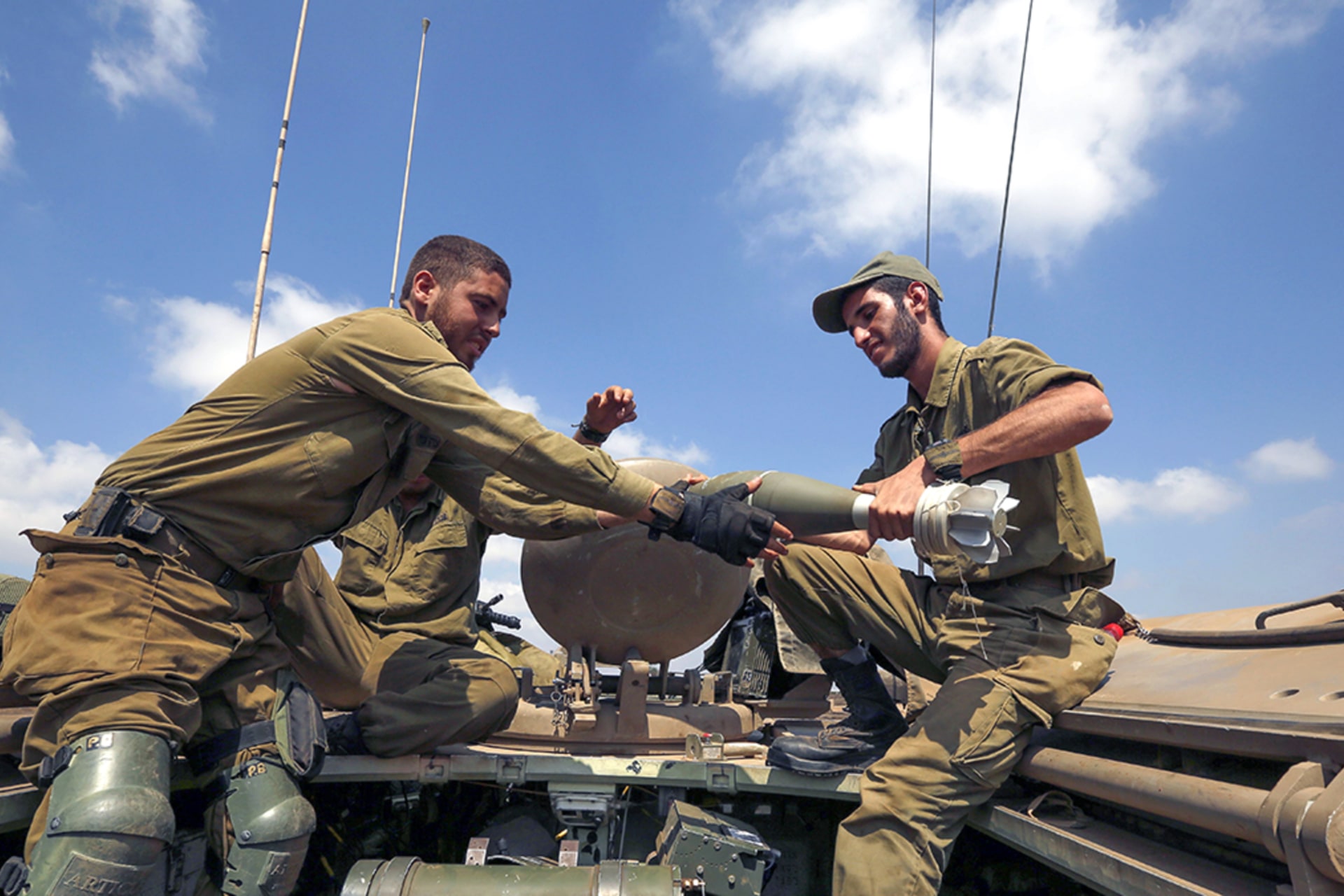Israel Is Doing All the Dirty Work Against Iran
The United States came up with “maximum pressure”—but the Israeli government is the only one carrying it out.

By experts and staff
- Updated
Experts
![]() By Steven A. CookEni Enrico Mattei Senior Fellow for Middle East and Africa Studies
By Steven A. CookEni Enrico Mattei Senior Fellow for Middle East and Africa Studies
This article first appeared here on ForeignPolicy.com on September 4, 2019.
I collect T-shirts, and among my favorites are the ones I have picked up in my wanderings throughout the Middle East. I have the obligatory Abdel Fattah al-Sisi T-shirt, the once-obligatory Mohamed Morsi T-shirt, and a tee with the seven founders of the United Arab Emirates. I picked up an “I Love Mecca” shirt during my last visit to Saudi Arabia. My all-time favorite is a shirt with a stick-figure Israeli and a stick-figure Palestinian urinating on a stick figure called “Peace Process.”
Then there was the shirt depicting weapons systems that the United States had generously provided to Israel against bold letters declaring, “Don’t Worry America … Israel Is Behind You.” That design annoyed me when I first spotted it during the Clinton administration in the Old City of Jerusalem, but if I came across it today, I might spend a few shekels for it. It seems to capture the current moment better than anything else in my collection.
Against the backdrop of the Trump administration’s passivity in response to Iranian aggression in the Persian Gulf and the generalized confusion about U.S.-Iran policy, the Israelis are the only ones applying “maximum pressure” on Iran—and it seems to be working. When American officials next meet their Iranian counterparts, it is likely because the Israeli military made it possible.
In the lazy days of August when the media spotlight was on Hong Kong, the administration’s trade war with China, mass shootings in the United States, the G-7 meeting, and fires in the Amazon, the Israelis were pounding the Iranians and their allies. Over the course of a week, the Israel Defense Forces (IDF) hit an Islamic Revolutionary Guard Corps base in Syria, destroyed a weapons depot for the Iranian-aligned Popular Mobilization Forces in Iraq, and undertook drone strikes on Hezbollah in Lebanon. It is likely not the case that United States had a role in Israel’s military activity, but these strikes do accrue to the interest of both countries. Some analysts have speculated that given Israel’s Sept. 17 rerun election and Prime Minister Benjamin Netanyahu’s precarious political position, the operations were an effort to boost his chances of remaining prime minister. That could be, though the direct evidence is thin.
More likely, the Israelis have detected an increase in Iranian efforts to supply advanced weaponry to its allies that could harm Israel and thus went after this materiel. That is standing IDF policy, but the Israelis’ sense of threat is heightened by what they perceive to be the Trump administration’s penchant for speaking loudly but carrying a small stick on Iran. Clearly, Netanyahu fears that Trump will jump at the chance of a photo-op with Iranian leaders at some glamorous European hotel and not bother to negotiate a new, tougher nuclear deal that Israel and its supporters have sought. It is the North Korea scenario—lots of love, but no action. So the Israelis have stepped up their operations in both intensity and daring in an effort to ensure their deterrent.
The commentary on Israel’s actions has been mostly negative. That is not surprising. The Israelis are taking serious risks that could result in another war in Lebanon. They are certainly increasing the possibility of violence in the Gaza Strip, and potentially jeopardizing Americans and the American position in Iraq. That said, there is an upside to the Israeli operations, especially for those who advocate negotiations between Washington and Tehran.
With all deference to the oft-repeated “correlation should not be confused with causation,” Israel’s strikes in Lebanon, Syria, and Iraq seemed to have made an impression on Iran’s leaders. Livid that their weapons depots have gone up in smoke, Iraq’s Fatah Alliance, which represents Iranian-linked militias in Iraq’s parliament, called the Israeli strikes a “declaration of war”—against Iraq, if not Israel.
Hezbollah’s leader, Hassan Nasrallah, warned Israelis that their government was bringing violence upon them and, to make the point, Hezbollah fired on an Israeli army post during Labor Day weekend. While their allies were fulminating and engaging in limited violence against Israel, the folks in Tehran were apparently rethinking their strategy. Earlier in the summer—before the Israelis stepped up their operations—the Iranians were busy sabotaging shipping in the Persian Gulf, shooting down an American drone, and seizing a number of tankers transiting the Strait of Hormuz. Now they are believed to be inching toward talks with the United States.
Of course, there are several reasons why the Iranians may be showing some new flexibility—the Iranian economy’s continuing struggle under sanctions being chief among them. That is certainly pressure, and perhaps they fear the consequences for internal stability so they are looking for some relief in the way of negotiations. It is certainly plausible; crippling sanctions brought the Iranians to the table before, producing the Joint Comprehensive Plan of Action. Still, it seems like it was the combination of sanctions and Israeli military prowess that may have cowed the Iranians into talks.
Before anyone makes plans for Geneva or Vienna, a lot can happen. The Iranians could change their minds. After all, it is hard enough for Ayatollah Ali Khamenei to countenance negotiations even under the best of circumstances, given that the regime’s revolutionary legitimacy rests in part on hostility to the United States. There is an equal chance that Trump changes his mind, given his penchant for, well, changing his mind. Regardless, it seems clear that the trajectory for U.S.-Iran relations is renewed negotiations. And for that, all those supporters of engagement have Israel to thank. They might even consider buying a T-shirt to express their gratitude.
